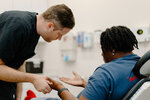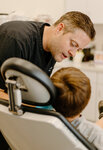DAPHNE — There are guidelines for many things in the U.S. when it comes to our health. We know it is recommended to get our teeth cleaned and checked every six months, have a mammogram starting …
This item is available in full to subscribers.
Please log in to continue |




DAPHNE — There are guidelines for many things in the U.S. when it comes to our health.
We know it is recommended to get our teeth cleaned and checked every six months, have a mammogram starting at age 40, a colorectal cancer screening starting at age 45. Have you ever wondered when you should start skin cancer screening?
Living on the Gulf Coast is a lifestyle that for many people includes boating, beaches, swimming and enjoying the outdoors. The lifestyle and sunshine are the reasons many people move to the area. We all know we should wear sunscreen, but it doesn't always happen.
According to the Skin Cancer Foundation, having five or more sunburns doubles your risk of melanoma. The American Cancer Society estimates 97,610 Americans will be diagnosed with melanoma of the skin and 7,990 deaths in 2023.
Gulf Coast Media sat down with board-certified dermatologist Dr. Ryan Ramagosa to learn more about when we should get a skin check and to learn more about skin cancer risk factors. He, along with Dr. Scott Freeman, founded Sunrise Dermatology in 2011. He specializes in general dermatology, skin cancer detection and treatment, pediatric dermatology and surgical dermatology.
Ramagosa started by explaining the two groups doctors and researchers split skin cancer into: melanoma and non-melanoma. The non-melanoma skin cancers are basal cell carcinoma, squamous cell carcinoma.
"The risks are somewhat different. There is some overlap, but there are differences genetically, difference in behaviors, difference in timeline and a big difference in seriousness," Ramagosa explained. "All of that kind of makes the waters a bit muddy because melanoma is risky, kills a lot of people, probably about 10,000 a year in the U.S., can hit people young and has a very high rate of productive lives lost."
He explained that melanoma is a cancer people tend to die from in the prime of their life around 46 to 57 years old, compared to prostate cancer, which according to the National Institute of Health has a median age of death of 79.5 years.
"One of the reasons you don't see a lot of concise screening recommendations is because the big groups that give you that answer, to tell you colonoscopy should be at 45, those groups are looking at one thing and can make a clear recommendation," Ramagosa said. "In skin cancer, it is much harder because it depends on what you are asking for and what the risk is. We don't see a lot of concise answers, and that probably won't happen because you can't get a government body to make one recommendation for three different diseases that have different risks for different people in different areas of the country and population. It is hard."
Skin cancers have a lot of different variables, from genetics, habits, geographical location and skin tone, to name a few. Ramagosa explained that melanoma has a strong genetic tendency, so it is important to know your family history, but genetics aren't the only risk factor.
"It is due to intense severe sunburns. Sun is a risk, but it is intense sun," he said. "Melanomas happen on the face but that is mostly in older people. The young people that get it tend to be on the backs of men and the back of legs of women. Those are the two most common areas. If you think of those areas, those are the areas your get roasted when you are a kid, but they are not out every day."
When it comes to the non-melanoma skin cancers (basal cell carcinoma and squamous cell carcinoma), Ramagosa said they are more related to chronic sun every day.
"That is why you see them on arms, hands, faces, ears and nose," he explained. "Areas that are chronically exposed. They can hit early, but because they have a much lower risk of being deadly or spreading, the screening recommendation is different."
Ramagosa, who was diagnosed with his first melanoma at the age of 22 and his second in his 30s, suggests parents start having their children checked by a board-certified dermatologist before they head off to college, around 17, 18 or 19 years old.
"A good dermatologist can usually start to differentiate those kids into high-risk and low-risk for melanomas," he said. "It is a nice time to talk about other things, like are they comfortable where they are with their acne or if there is any other skin stuff that has been a little annoying but might get worse because they are not sleeping as well and eating differently."
During that initial check, Ramagosa said he can see if the teen should come back annually or would be good to wait until 23 or 24 for their next check. Also, anyone with a spot that bleeds, is sore or itchy should have it checked.
"If you touch base, then you can put people in the group that should start annual checks at 30 and then ones you can say come back if something is bothering you or at 50 years old. There is a group of people that don't need annual skin checks until they are 50. If we had to pick a number, I would say 40 but that is what is so hard," Ramagosa explained.
When it comes to annual screenings, skin cancer screenings are the easiest and quickest. There is no prep or pain. Just you in a gown and a few minutes of a doctor's time. The overall message from Ramagosa was for children to get a check before college and for adults see a board-certified dermatologist and the doctor will let you know the frequency of surveillance they feel is best.
Big factors
Ramagosa said the big factors for skin cancers are skin type, genetics, location and childhood.
"They think, based on statistical research, your worst years are probably between 8 to 12 years and 20 to 25 years. That zone is the prime damage years that matter," Ramagosa said "You don't often see the outcomes of that, the basal cells, until 10 to 25 years later. Another factor is did you get blistering sunburns as a kid. The statistics for basal cells for caucasian people in the U.S. are that more than half of the people will probably grow one in their life."
Self-check
Like other self-checks, Ramagosa said doing regular self-skin checks are great, but they are not a replacement for a check by a specialist.
"I love the intention behind that ABCDEs of Melanoma campaign, which is really about awareness, but I think like a lot of social media stuff, people take that and think they are going to be able to make themselves an expert if they do a little extra research," Ramagosa said. "That can be a reason to get something checked but the real thing is to just incorporate a real, trained, board-certified dermatologist into their surveillance at some interval that may be very intermittent like several years between or might be every year. The reality is it takes a long time to get good at identifying and evaluating skin lesions."
Sunscreen
We all know the importance of sunscreen and Ramagosa stressed its importance. He recommends using a physical sunscreen, zinc and titanium-based sunscreen.
"Sunscreen is super important," he stressed. "I always push people toward physical sunscreen with zinc and titanium for two reasons. One, they are way better than they used to be. You can get them now that are fairly invisible and don't leave you white and pasty. They add it to all kinds of high-quality products. The second is it avoids all the controversy with sunscreen now."
Ramagosa said the difference between an SPF 30 and SPF 100 isn't three and 1/3 better, it is probably 10% better. He said if the higher SPF is the same cost by all means use it. Otherwise, an SPF 30 is fine, just remember to reapply. He also said we need to apply more sunscreen than you may think.
See a dermatologist
Ramagosa said he has seen a decrease in the number of younger female patients coming in for regular checks, and he attributes that to the diffusion of cosmetic care. He said 10 years ago, if a patient wanted Botox or fillers, they had to see a dermatologist. Now they can get those procedures from a non-dermatology provider.
"It happens all the time where I am doing a cosmetic visit and they say what about this spot and it looks like a little precancer. I ask if they get checked and they say they have never had a skin check. I look at the chart and the woman has been doing fillers for seven years but never stepped into the dermatology space," Ramagosa said. "That separation, we probably lost some of the automatic pickup checks we would have gotten. It is OK to do both. If someone just loves their OBGYN who does their cosmetic stuff, if you are happy that is great but that shouldn't prevent you from coming and getting the medical care part because they certainly aren't looking for your melanomas."
Hope for the future
Those who grew up before sunscreen was a normal thing are being more diligent with the next generation.
"Our generation, now in our 30s, 40s, 50s, we are being smarter. We are not perfect. We are being more diligent with our kids than our parents were. I think we are being more diligent as middle-aged people. I think that while we are seeing a lot of 40-somethings with basal cell, I am hopeful that at 70 we are not going to be where the 70-year-olds of today are," Ramagosa said. "I am hopeful. It is important to feel that way too, so you don't feel defeated because there is a real reason to fight.
"My goal with patients is always to come in at least once as a teenager or early 20s. Basically, anyone that is reading something that is over 18, has never had a check, never taken their shirt off for a dermatologist should just come in once and get surveillance. What is the saying? 'The best time to plant a tree was 20 years ago; the second-best time is today.' It is the same story with skin cancer. I wish we could go back, but we can't. Today matters, too. Don't quit."